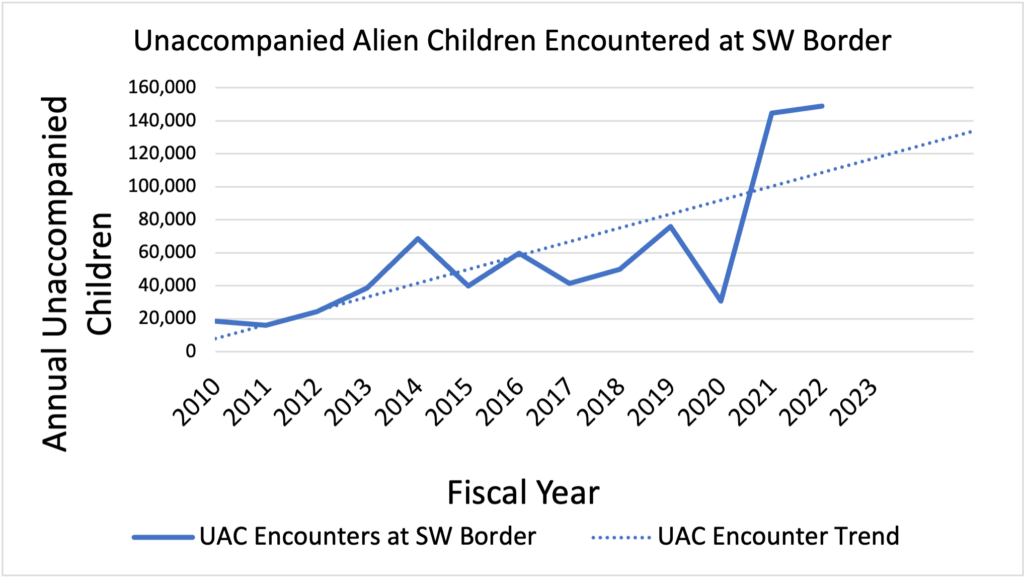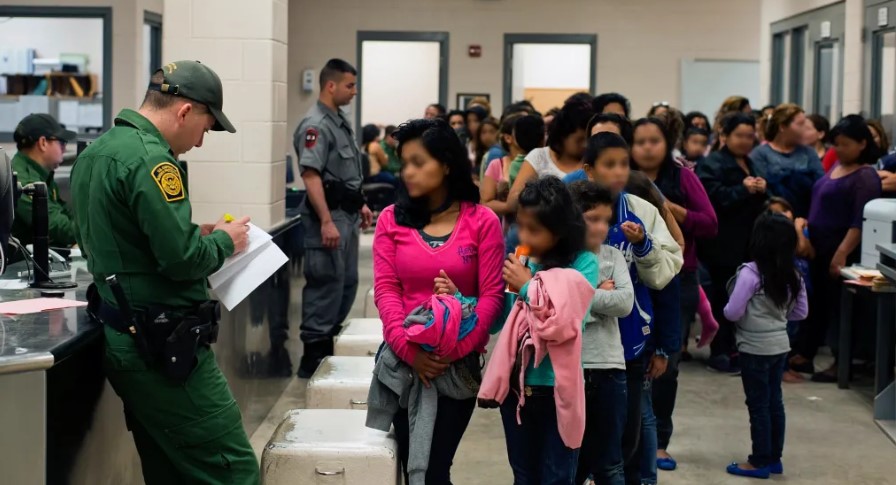On May 4, the Department of Health and Human Services’ (HHS) Office of the Inspector General (OIG) released another scathing report on the Office of Refugee Resettlement’s (ORR) mismanagement of the unaccompanied alien children program. The report, titled, “The Office of Refugee Resettlement Needs to Improve Its Practices for Background Checks During Influxes,” looks at the background checks and vetting procedures of employees, especially in light of staggering and record increases in the number of unaccompanied children coming to our southern border.
In short, the OIG found that ORR did not “conduct or document all required background checks” on all employees or did not conduct the checks in a timely manner. “In addition,” the Inspector General wrote, “ORR did not require the transportation services contractor we reviewed to conduct background checks on employees as required by ORR minimum standards.”
The report is another blow to the Biden Administration, and another strong criticism of its mismanagement of the unaccompanied alien children program. To understand the OIG’s findings, we must consider the unprecedented number of children coming into this country who have no parent or legal guardian, or do not have anyone available to assume custody and care for them. In fiscal year 2022 alone, nearly 150,000 unaccompanied children were encountered at our southwest border.

ORR, the office with the responsibility to oversee unaccompanied alien children, has authority to enter into cooperative agreements with entities to set up facilities to temporarily house children until they are placed with sponsors. There are several types of facilities in their network, including shelters, transitional foster care, long-term foster care and staff secure facilities. During times of surges, ORR has set up influx care facilities (ICFs) or emergency intake sites (IESs) to ensure there are adequate beds to house children along the border.
The OIG’s study looked at several of these facilities, conducting site visits in May and June 2021. The OIG report says, “[a]cross the 11 sites, we reviewed background checks for 259 employees, and across the 10 EISs, we reviewed background checks for 89 detailed Federal employees to verify that required background checks were conducted.” The OIG also reviewed background checks for a sample of 10 drivers and 20 transportation specialists associated with an ORR contractor.
The OIG found that ORR “did not conduct or document all required background checks or did not conduct the checks in a timely manner.” Specifically, it found the following:
- ORR did not require the transportation services contractor reviewed to conduct background checks on employees as required by ORR minimum standards;
- ORR was not consistent with issuing waivers for FBI fingerprint checks and child abuse and neglect checks for employees at emergency intake sites;
- public records checks used by emergency intake sites may not have been reliable; and
- several emergency intake sites did not ensure secure facility access.
In one footnote, the OIG stated that “[s]even of the sampled employee background checks included offenses that may have made the employee unsuitable to work with children in a child care setting.”
As stated by the OIG, background checks “are a critical component of the screening process for employees who work with children,” and, thus, they are required. The OIG notes that “[f]ederal regulations prohibit an ORR care provider facility from hiring or enlisting the services of any individual who will have direct contact with children if the applicant has engaged in sexual abuse, sexual harassment, or any type of inappropriate sexual behavior.” Further, ORR guidance requires that facilities “complete” these required background checks before staff, contractors and volunteers are hired.
While the OIG only looked at a sample of the employees and contractors, the lax vetting is a significant problem that cannot be ignored. Given the likelihood of surges after President Biden terminates the Title 42 expulsion authority on May 11, it is critical that unaccompanied children who come into the government’s care are cared for by adequately vetted employees.
There are several types of background checks done on federal employees and contractors. Namely, there are the following:
- Public Records Check – a name-based check that searches for an individual’s criminal history in public records.
- FBI Fingerprint Check – this check pulls data reported to the FBI by various Federal, State, and local jurisdictions.
- Child Abuse and Neglect (CA/N) Check – a check that determines whether an individual has been reported in a specific State to have committed child abuse or neglect or has a record of substantiated maltreatment of a child, depending on the content of a State’s registry.
- Department of Justice (DOJ) Sex Offender Registry Check – a name-based check of a public website that provides access to the sex offender registries of the 50 States, District of Columbia, U.S. Territories, and Indian Country.
- State Criminal History Repository Check – this check determines whether an individual has been convicted of a sex crime in that State, or an offense involving a child victim, or a drug felony.
The OIG not only detailed the failures, but he made several recommendations. Specifically, the OIG recommends the following:
- Ensure required background checks are conducted on current employees for whom checks were not conducted;
- Clarify and reissue guidance;
- Include a review of each facility’s compliance as part of ORR’s routine site visit monitoring; and
- Ensure that future awards and subawards for services that involve children include detailed information on required background checks.
While the agency concurred with the OIG’s recommendations and described the actions it has taken to address its findings, it remains to be seen if the Biden Administration will learn from the HHS Inspector General and continue to work to clean up the program.
The report is an ongoing effort by the Inspector General to review the Unaccompanied Alien Children program. To date, the OIG has audited and evaluated the program on several occasions. As noted in the report, the OIG is currently examining the placement and transfer of children by ORR, and the safe and efficient release of children to sponsors. FAIR looks forward to the OIG’s continued work and findings related to the program.
















